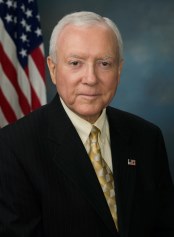 |
| Utah Senator Orrin Hatch |
After 5 straight days of near-continuous negotiations, U.S. trade officials have finally delivered a Pacific Rim accord designed to forge closer business ties with eastern Asia and knit together Pacific commerce. But to complete the Trans-Pacific trade deal, the U.S. reportedly had to step far back from a hotly sought-after provision that would have guaranteed market exclusivity for new biologics by 12 years throughout the vast region.
According to The New York Times, the U.S. has agreed to a hybrid arrangement that will stave off biosimilar competition by only 5 to 8 years, something that the U.S. industry immediately balked at.
Details of the trade agreement are hard to come by and won't be fully available for some time to come, but word of the biopharma compromise comes after that exckusivity issue became a key hurdle to getting the agreement wrapped. In the end, negotiators came around much closer to the stand taken by a number of countries anxious to take advantage of cheaper knockoffs as soon as possible.
The 12-year protection for biologics, now written into U.S. law, has been a linchpin piece of legislation for the industry. By holding on to exclusivity for an extended period of time, developers have a chance to earn huge profits for a lengthy stretch, something that had helped make biotech a lucrative haven for generalist investors over the past three years.
Utah Senator Orrin Hatch has already said he would come out against the accord unless it safeguarded the 12-year exclusivity agreement, and Republicans in general are expected to come out opposed to the deal--right alongside Democratic presidential contender Bernie Sanders.
BIO's Jim Greenwood didn't waste much time before signaling his opposition.
"While the TPP agreement will not impact the U.S. data protection period, we believe the failure of our Asian-Pacific partners to agree to a similar length of protection is remarkably short-sighted and has the potential to chill global investment and slow development of new breakthrough treatments for suffering patients," he said in a statement.
The industry trade group PhRMA didn't try to hide its disappointment this morning.
"We are disappointed that the Ministers failed to secure 12 years of data protection for biologic medicines, which represent the next wave of innovation in our industry," PhRMA said in a statement. "This term was not a random number, but the result of a long debate in Congress, which determined that this period of time captured the appropriate balance that stimulated research but gave access to biosimilars in a timely manner."
Now comes months of heated debate as Congress wrangles over the trade agreement in the lead-up to a presidential election. And President Obama is expected to work hard lobbying for support for another deal that could become a big part of his legacy--whether the industry likes it or not.
- here's the feature from The New York Times